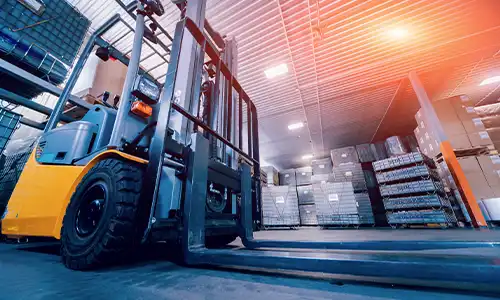3rd Party Logistics (3PL) – What It Is & Why It’s Important

Published: March 16, 2024 | Last Updated: April 14, 2024
“Third party logistics”, “3PL”, “logistics” – odds are you’ve heard these terms.
But if you’re here, you’re probably not sure what exactly they actually mean. What’s the difference between “logistics” and “third party logistics” (if any)?
As Australia’s leader in 3PL warehousing, logistics, and nationwide transport; we’re here to set the record straight once and for all.
Logistics Defined
According to the Bureau of Infrastructure and Transport Research Economics (BITRE):
Logistics is broadly defined as the activities required for the movement and handling of goods and materials, from inputs through production to consumers and waste disposal.
Logistics is the part of the supply chain that coordinates the efficient flow of goods from the point of origin to their final destination.
It’s an expansive term, oftentimes involving many processes and parties, all of which are involved in facilitating the effective flow of goods from the point of sourcing (procurement) all the way to the end user. This process also includes product returns (reverse logistics), and even the disposal, recycling, and the redistribution of returned goods.
Third Party Logistics (3PL) Defined
Third party logistics, or 3PL, is a term that refers to logistics that is conducted by another company (a third party) that specialises exclusively in providing logistics services for their customers.
3PL providers leverage technology, large transport networks, and special expertise to ensure their customer’s goods get to where they need to go safely & effectively.
Logistics vs. 3PL
Simply put, the term “logistics” refers to the whole process of getting products from point A to point B; and the term “3PL” refers to logistics when it’s provided by a third party.
3PL providers orchestrate the logistics process on behalf of their customers. So when a company hires another company to handle their logistics, they’re hiring a 3PL provider.
When a company handles all of their logistics themselves, that’s not 3PL. That is referred to as just “logistics” , or sometimes 1PL (first party logistics).
While the terms are often used interchangeably, they’re not mutually exclusive. “3PL” is always “logistics”, but “logistics” is not always “3PL”. 3PL is used to refer to a type of logistics involving a 3rd party.
Key Functions of 3PL Providers
3PL providers provide end to end solutions for managing the flow of goods for their customers. Here are some of the key logistics processes that they handle:
Planning
3PLs work with their customers to determine what needs to go where and their specific requirements, then develop a plan to get it there. The planning process includes determining the mode of transport, negotiating prices, and preparing any necessary paperwork.
Procurement
Procurement refers to the sourcing of the products and the raw materials used to make them. 3PL providers aid in sourcing the right quantities, negotiating the prices, and assuring quality standards.
Materials Handling
Materials handling refers to the movement of goods around a warehouse. It involves organising the products, so they can be accurately and effectively fulfilled.
Picking & Packing
Picking and packing involves selecting items from warehouse inventory based on customer orders and securely preparing them for shipment. It streamlines locating products, gathering correct quantities, and packaging them with necessary materials for prompt delivery, ensuring order accuracy and optimising delivery speed.
Transport
Transport (Also called freight forwarding) refers to the physical movement of the goods by truck, rail, air, sea, or intermodal.
3PL providers handle all elements associated with this transport. Asset-based 3PL companies may physically transport the goods, and non asset based companies will book the transport with one of their partners.
Warehousing
Warehousing refers to the element of logistics related to the handling and management of goods within a facility. It’s key components include fulfilment, storage, and distribution. When conducted by a third party, it’s referred to as 3PL warehousing.
Tracking & Tracing
3PLs utilise technology to keep an eye on their customer’s shipments, ensuring it stays on schedule, and even rerouting or expediting the freight in transit if any issues occur.
Customs Brokering
Customs brokering refers to facilitating the import and export of goods across international borders. It includes managing documents, ensuring compliance, calculating duties and taxes, and communicating with customs authorities to clear shipments efficiently.
3PL Benefits
3PL providers implement logistics for their customers day in and day out. Their heavy specialisation in managing the effective flow of goods from their origin to their destination poses a number of benefits for Australian businesses, including:
Cost & Time Savings
Third party logistics providers run well-oiled machines designed to cut costs and provide fully managed logistics. This translates into major cost & time savings for their customers.
Enhanced Safety & Compliance
3PLs are dedicated to upholding the utmost standards of safety, and remaining compliant with the relevant laws. Ensure your materials get to where they need to go safely, while following the rules.
Fully Managed Services
Logistics is an expansive process, requiring a major investment in people and equipment. By outsourcing your logistics needs to a specialised provider, you get to leverage their systems to handle every element of your supply chain, worry-free.
Increased Efficiency
3PLs make a business out of maintaining efficient operations. Whether that means leveraging the latest technology, taking the fastest route, or dispatching an extensive carrier network; they’re going to ensure your goods are moved to meet your specific needs at the best price.
Greater Bandwidth
3PLs have extensive networks of people and equipment. They navigate the intricacies of the most advanced requirements, so you don’t have to. Expedited shipments, hazmat materials, intermodal transport – you name it, they’ve got the bandwidth to get it done.
Flexibility, Reliability, & Peace of Mind
Simply put, 3PLs do one thing – logistics. Instead of worrying about handling the time & labour-intensive requirements of logistics in-house, hand it off to the experts. They’ll let your business focus on its core competencies while your logistics requirements are handled out of sight, out of mind.
The Bottom Line
3PL, or third party logistics, is a term used to refer to fully managed logistics services by specialised providers.
3PL companies specialise in facilitating the safe, efficient flow of their customers’ goods; from point of origin all the way to their final destination. This includes sourcing & handling the materials, transport, warehousing & storage, distribution, and general customer service.
Outsourcing logistics requirements to a 3PL provider can introduce many efficiencies to small & large businesses alike. The main reason is that 3PL providers have a sole focus in logistics. They invest heavily in people, products, and processes to ensure their customers are getting their goods moved safely & effectively.
If you’re considering reaping the many benefits of outsourced logistics services, then consider the experts at Freight Assist Australia (that’s us). As a family-owned business that’s been around since 2012, we’re dedicated to providing winning supply chain solutions for our customers that increase efficiency and deliver total peace of mind.
Click here to start the conversation with one of our dedicated logistics experts.
Dangerous & Hazardous Goods
Metro Distribution
3PL Warehousing & Distribution
Interstate Freight

Compliant, safe and secure transportation of dangerous & hazardous freight.

Door-to-door, store-to-door metro taxi truck services – no job too small.

Efficient, streamlined 3PL solutions for storing and distributing your freight.

Safe, reliable state-to-state transport for shipments ranging from a single pallet to a full truckload.



